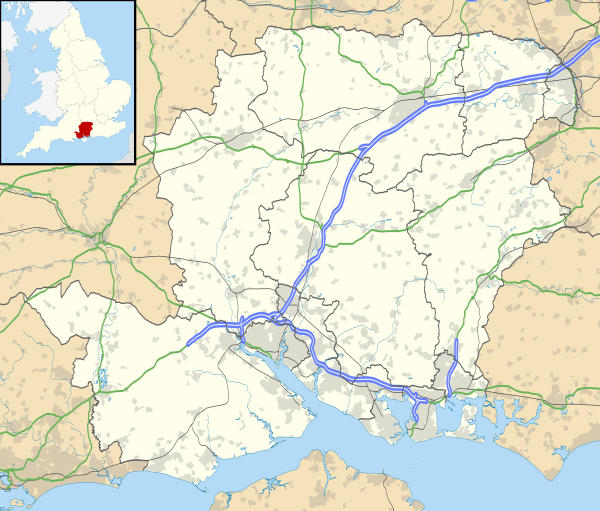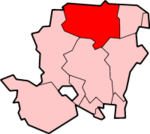Old Basing
| Old Basing | |
|---|---|
 The Street, Old Basing | |
 Old Basing Old Basing shown within Hampshire | |
| Population | 7,232 |
| OS grid reference | SU664528 |
| • London | 49.6 miles (79.8 km) |
| Civil parish |
|
| District | |
| Shire county | |
| Region | |
| Country | England |
| Sovereign state | United Kingdom |
| Post town | Basingstoke |
| Postcode district | RG24 |
| Dialling code | 01256 |
| Police | Hampshire |
| Fire | Hampshire |
| Ambulance | South Central |
| EU Parliament | South East England |
| UK Parliament | |
Old Basing is a village in the English county of Hampshire. It is situated just to the east of Basingstoke, and in the 2001 census had a population of 7,232. Its former name is Basing (which several neighbouring village signs highlight).
History
Old Basing was first settled around 700 by an Anglo-Saxon tribe known as the Basingas, who gave the village its name (the meaning being "Basa's people").[1] It was the site of the Battle of Basing on 22 January 871, when a Danish army defeated Ethelred of Wessex. It is also mentioned in the Domesday Book of 1086.
The centre of the village, The Street, contains many old houses, and St Mary's Church. The River Loddon, whose source is in Worting to the west of Basingstoke, flows through the village. Old Basing is perhaps best known for the ruins of Basing House which was built between 1532 and 1561 on the site of a Norman castle. It was the home of the Marquesses of Winchester for several generations before being destroyed after a 24-week siege during the English Civil War. Many names in modern Old Basing allude to the war, such as Cavalier Road and Musket Copse, as well as several sites named after Oliver Cromwell including Oliver's Battery, Cromwell Cottage and Oliver's, a fish and chip takeaway and restaurant.
The route of the former Basingstoke Canal also ran around Basing House and then through and around parts of Old Basing.
In 1967, the name of the village was changed to Old Basing. Starting in the 1980s, the Lychpit estate was developed to the north of the village, within the boundaries of the civil parish. In 2006, the name of the civil parish was changed to "Old Basing and Lychpit".
Governance
The village of Old Basing is part of the civil parish of Old Basing and Lychpit[2] which in turn is part of the Basing ward of Basingstoke and Deane borough council.[3] The borough council is a Non-metropolitan district of Hampshire County Council.
The Basing ward elects three councillors to Basingstoke and Deane Borough Council and is part of the Basingstoke constituency in elections to Parliament. The current Member of Parliament for Basingstoke is Maria Miller (Conservative) and the current councillors are Onnalee Cubitt (Independent), Stephen Marks (Conservative) and Sven Godesen (Conservative).

Education
Old Basing provides both an infant school and a junior school. The junior school, named St Mary's, is aided by the Church of England. A new primary school has recently opened in nearby Lychpit. Children from Old Basing proceed to a variety of secondary schools in the Basingstoke area.
Sport
Basing Rovers F.C. is the local football team, founded in 1886. The Recreation Ground in Old Basing plays host to a variety of sporting events as well as the Old Basing Carnival. There are rugby union and football pitches which overlap a cricket ground in addition to five tennis courts (of which one is free), an archery area and a lawn bowling green.
Literature
Edward Lear makes reference to Old Basing in his A Book of Nonsense:[4]
"There was an Old Person of Basing,
Whose presence of mind was amazing;
He purchased a steed,
Which he rode at full speed,
And escaped from the people of Basing."
People
- William Paulet, 1st Marquess of Winchester, buried at St. Mary's Church
- John Paulet, 2nd Marquess of Winchester, buried at St. Mary's Church
- Elizabeth Paulet, buried at St. Mary's Church
- William Paulet, 3rd Marquess of Winchester, buried at St. Mary's Church
- Elizabeth Seymour, Lady Cromwell, buried at St. Mary's Church
- William Paulet, 4th Marquess of Winchester, buried at St. Mary's Church
- Charles Paulet, 1st Duke of Bolton, buried at St. Mary's Church
References
- ↑ Ekwall, E. (1940). The Concise Dictionary of English Place-names (2nd ed.). Oxford: Clarendon Press. p. 28.
- ↑ "Hampshire County Council's legal record of public rights of way in Hampshire" (PDF). 2008. Retrieved 28 October 2010.
- ↑ "Basingstoke and Deane Wards info". 2010. Archived from the original on 24 October 2010. Retrieved 28 October 2010.
- ↑ Lear, Edward (1846). A Book of Nonsense. London: Thomas McLean.
External links
| Wikimedia Commons has media related to Old Basing. |
